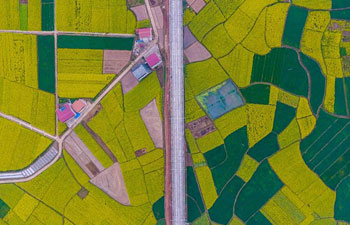NAIROBI, Dec. 6 (Xinhua) -- The UN Environment and the government of Niger on Wednesday signed an agreement to assess environmental and human impacts caused by the armed conflict and terrorism in the Lake Chad Basin.
The agreement which was inked in Nairobi follows a request by Niger to enable the global environmental agency to help them carry out an accurate assessment of the situation following the actions of Boko Haram terrorist group that operates in the neighboring countries.
"We plan to carry out the assessment and propose solutions in helping the country promote environmental governance in the areas that are badly affected by the terrorist groups," said Juliette Koudenoukpo, Director and Regional Representative of UN Environment in Africa during the signing ceremony.
Koudenoukpo noted that UN Environment plans to help the country reduce environmental causes of youth migration and conflicts.
According to the UN, Niger is a transit country of migration and is surrounded by hotspots of conflict aggravated by the actions of the Boko Haram terrorist group that thrives on young people and feeds on the current context of poverty.
Koudenoukpo said that under the agreement, the UN Environment will promote cooperation and mutual assistance in the areas of environmental governance, chemicals and waste management and the fight against all forms of pollution, promotion of sustainable consumption and production.
The cooperation will strengthen environmental monitoring in Niger through collecting, processing and analyzing environmental data for a better knowledge of the state of the environment and natural resources.
The UN agency also plans to support Niger in the implementation of its strategy and action plan for biodiversity in the context of its fragile ecosystems and in respect of its threatened species, review and update of the National Biodiversity Strategy and Action Plan and their alignment with strategies to combat climate change and the illegal trade in wild flora and fauna.
The UN Environment will also assist Niger in the fight against climate change, the transition to green economy and the protection of biodiversity.
Koudenoukpo revealed that through the cooperation, Niger's potential and constraints will be assessed in order to start a transition model towards a low-carbon economy, creation of an institutional, regulatory and fiscal framework that encourages investment in the economy.
"We have decided to engage in the transition to a green economy by accelerating the process of developing related strategy, starting activities in the fields of renewable energies, forest resources and promoting green buildings," said Almoustapha Garba, Niger's Minister of Environment and Sustainable Development.
Garba noted that the country intends to take advantage of the cooperation to maximize opportunities within the green economy to help create green jobs in order to reduce unemployment that drives young people to join extremist groups.
"This will also help us in the development of national skills in the green sectors and technologies to reduce the recent migration to other countries," he added.
The UN Environment will support Niger in the implementation of its Nationally Determined Contribution (NDC) including its adaptation and mitigation programs to enable the country to ensure food security, alleviate poverty and contribute to global emissions reduction.
It will also support the country to participate in the mitigation efforts of the international community and mitigation efforts in the energy sector by mobilizing domestic resources and climate finance opportunities, source for adequate investments to facilitate access to cheap and sustainable and clean energy.

















